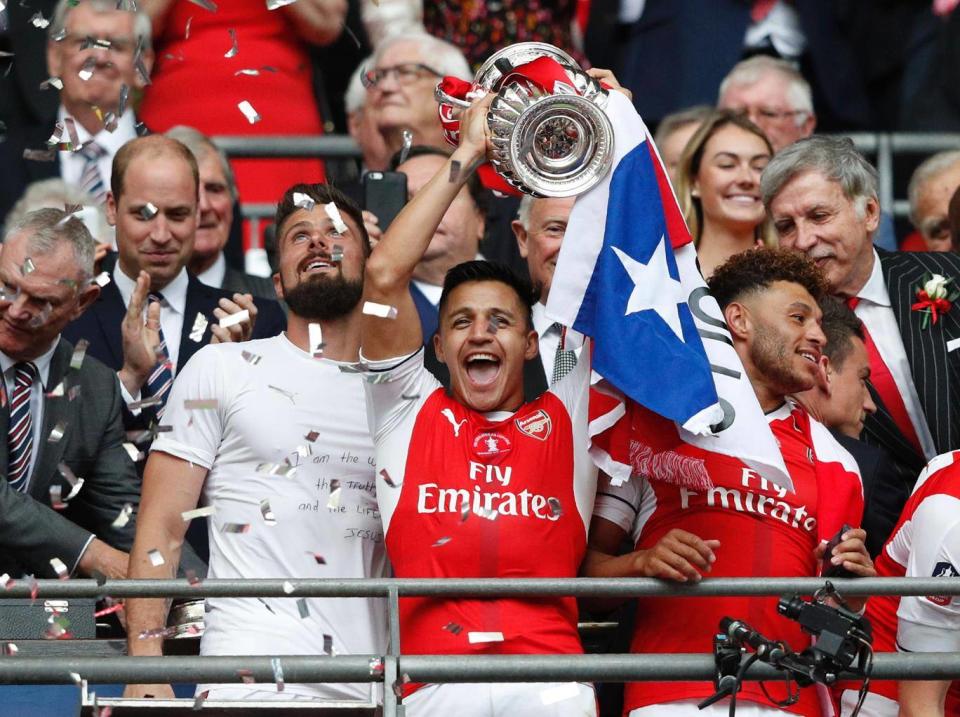What legacy does Alexis Sanchez leave at Arsena as he prepares to head to Manchester Cityl?
It does not require much mental effort to remember the feeling at Arsenal in the summer of 2014. Arsene Wenger had just signed a new contract extension, only ending the speculation after the season had finished. His long reign, which many thought had run its course, would go on for another few years yet.
Fans wondered if Wenger could ever win a Premier League title again, as their rivals, with bigger budgets and younger managers, moved off into the distance. But at least they had got their hands back on the FA Cup.
Those were the circumstances, more or less, into which Alexis Sanchez arrived in July 2014, after playing for Chile in the World Cup. Arsenal paid Barcelona £32million for a world-class 25-year-old forward, who had only been forced out by the arrival of the even better Luis Suarez. There was plenty of optimism that Sanchez would propel Arsenal back to the top.
But three and a half years on, as Sanchez prepares to clears out his locker and head to Manchester City, how much has changed? The summer of 2017 was almost identical to 2014, but with the added frustration for Arsenal fans that they had seen it all before.
The team, frankly, is now going nowhere, slogging through the Europa League, even further away from the top than they were last year. And as the brief Sanchez era nears its end, you wonder whether he leaves any real Arsenal legacy at all.
READ MORE: Wenger hopeful of Sanchez stay
READ MORE: De Bruyne in no rush to extend contract
As an individual footballer, though, Sanchez has been excellent. Maybe not quite the best in the country since he arrived, given Eden Hazard, Harry Kane and Kevin de Bruyne, but near enough to be proud about. His mix of close control, muscular power, and audacity around the goal make him a perfect Premier League player, especially given his innate hunger for playing the game. In a team which has taken on far too much mediocrity, Sanchez’s solo brilliance has stood out.
Sanchez will likely leave with 60 Premier League goals and another 20 in the cups, many of them brilliant. Every Arsenal fan will have their own favourites: from the no-backlift side-foot volley against Manchester City, the rocket from just outside the box against Liverpool, the stepover/dink combo at West Ham United.
What stands out most – and he will be remembered for – are his performances at Wembley in the FA Cup. In 2015 he beat Reading single-handedly in the semi-final before scoring an out-of-the-blue 35-yarder against Aston Villa in the final. Two years later, he scored the winner against Manchester City in the semi-final, before opening the scoring against Chelsea in the final.
Arsenal did not expect to win either game but ended up winning both. Sanchez did more than anyone to win those two FA Cups, and given the nine-year trophy drought from 2005 to 2014, that is nothing to sniff at.
But as Wenger knows very sharply, FA Cups are no longer the measure of progress or success. Modern football is only really about the Premier League and Champions League, and in those two Sanchez has not been able to push Arsenal any closer to the prize. In the league, Arsenal have not put together one serious title challenge during his time here, only ever finishing double-digit points behind the winners. They were far closer, in fact, in 2013-14, just before Sanchez arrived.

Then in the Champions League Sanchez was here for three consecutive last-16 exits, by increasingly heavy margins, to Monaco, Barcelona and Bayern Munich. There is no better proof of Arsenal’s lack of progress than that. Sanchez has only played one game in this year’s Europa League campaign, against FC Koln, and played as if he thought it was beneath him.
That, ultimately, has been the problem for Sanchez at Arsenal: he has been the world-class player in an average team. At the start he looked like he enjoyed the responsibility but for the last year or so his exasperation and disrespect for his team-mates has been bad on the pitch, and worse in training.
Which is why he is now so unpopular in the dressing room and why he was shunned celebrating his goals at Selhurst Park last month. And why Arsenal know that they should have sold to City back in August, for twice as much money, rather than letting the situation drag on.
But you cannot blame Sanchez for feeling frustrated. He is a very good player who has given the peak years of his career to Arsenal. He wanted a team on the same level and he has not got one, so now he has to go and find it elsewhere. It was just the same with Cesc Fabregas and Robin van Persie, Arsenal’s two best players from that first team of the Emirates era, who now have the Premier League winner’s medals their performances deserved. They found what Sanchez has done: that Arsenal is a nice place to play, but a lonely place to be a top player.


